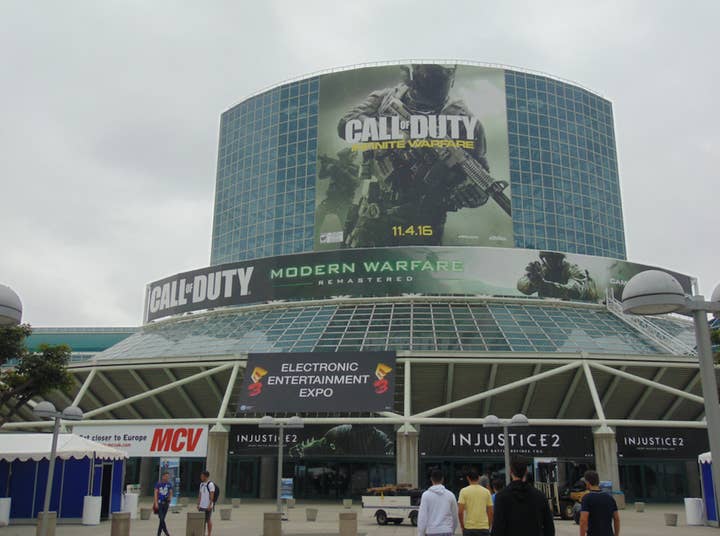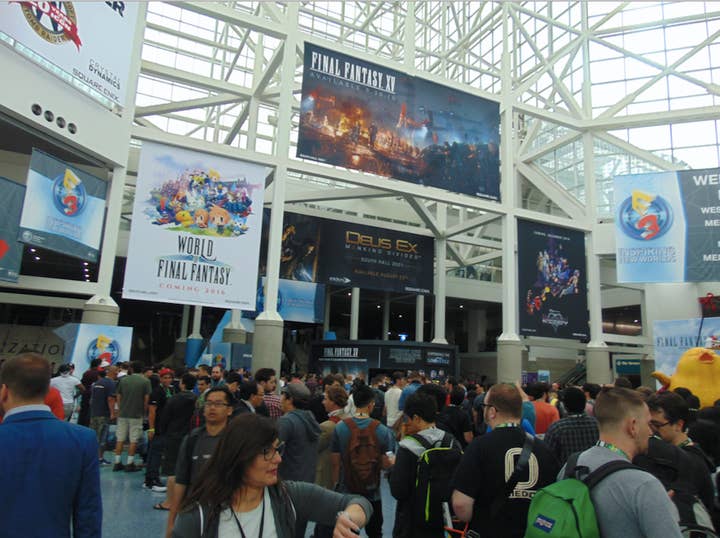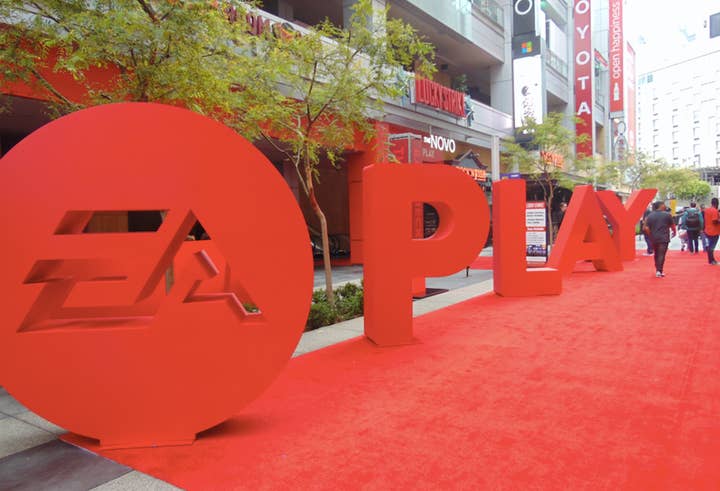"This move is long overdue" - Industry responds to E3 going public
Publishers and developers back ESA's move, but questions remain over price, the number of consumers and whether the show is suitable for them
As the last great beast of the industry-only trade shows finally gives in to the pressure of becoming a public event, we collected the thoughts of some of the industry stakeholders - publishers, journalists, analysts and developers - who would be affected by the decision.
An official Microsoft spokesperson was predictably non-committal about the news, sticking to their corporate guns, but welcoming the chance to show off games to more players.
"We're looking forward to E3 this year and the opportunity for more fans to come to the show," their statement reads. "Stay tuned for more information."
Ubisoft is equally supportive, describing the whole idea as a test. "We support the ESA's approach to open up E3 to more consumers, and this year will be a good test for the new hybrid model. Getting games in players' hands early and hearing their feedback helps our industry, both in terms of improving the quality of games and shining a light on new and innovative ideas and technology."
"This year will be a good test for the new hybrid model."
Ubisoft spokesperson
Alex Hayer, senior brand manager at Torn Banner Studios (makers of Chivarly: Medieval Warfare) concurs: "E3 opening its doors up to the public represents a very exciting development when it comes to game creators connecting directly with players. That's always the best aspect of any show we take our games to: direct feedback from people who can give us their unfiltered and honest impressions. This is the ultimate litmus test for any game - so we are excited about this new direction for E3 and what it will contribute towards the increasing trend of barriers dropping between players and devs."
Many of the people we spoke to seemed to view ESA's efforts as more of a test to see if the show should embrace the consumer element completely.
"I think It's worth a try and see how it goes," says Gavin Price, head of Yooka Laylee makers Playtonic. "Successive shows can always be tweaked pending the feedback they receive. As creators we always cherish the opportunity to get our games in front of core audiences and speak to fans in such settings."

One of the key elements behind ESA's move with E3 is related to the changing nature of PR and marketing - today, publishers view consumers and influencers as being as important as the traditional press.
"I think the expansion of the audience is a great step forward," says NPD analyst Mat Piscatella.
"The market has evolved, particularly in the world of marketing and PR. Influencers and fans are having as much - or more - reach than traditional outlets. The enthusiasm from these new attendees should be palpable and bring new life to the floor. And, let's be honest, over the last couple years there certainly haven't been the crowd issues that were experienced 10 to 15 years ago.
"Business will still get done behind closed doors, as has been the case for years. Retailers will not be waiting in line, and media will still be able to set appointments to see the games.
Mat Piscatella, NPD
"Business will still get done, behind closed doors or in conference rooms, as has been the case for years. Retailers will not be waiting in line, and media will still be able to set appointments and see the games. I see this as the industry recognizing that the market is changing, that embracing fan passion is the best way to build and grow the business, while at the same time allowing for easier proving out of ROI on publisher investment. The only bummer for me is that I expect the lines at the food trucks between the halls to get a bit longer. Other than that, I think it's a thrilling change, and one I'm very happy to see."
This is a view shared by Team17 boss Debbie Bestwick: "In today's world, we message and market direct to gaming fans and we hugely welcome this new E3 approach, building and engaging with gaming communities is one of the key pillars of marketing today. The move is long overdue as we have all seen the tremendous success that is Gamescom Europe. What remains to be seen, and what I believe is going to be the biggest challenge for E3, is how to make sure trade will be able to carry on their usual business without detracting from consumer's enjoyment and vice versa."
Publishers, developers and analysts have welcomed the move, in fact Sega Europe president Jurgen Post feels that 15,000 number should be higher.
"Allowing consumers to attend E3 is definitely a step in the right direction for the show," he says. "I don't believe it will be damaging at all, if anything it will make E3 more lively and add to its atmosphere, as consumers excited to play and see their most eagerly anticipated games for the first time will create a great buzz. My only question would be, is 15,000 enough?"

Of course, the big concern - as alluded to in the above answers - is crowd control. E3 is a busy event already and the idea of adding a further 15,000 people to that show sounds daunting. But Chris van der Kuyl, former CEO and now chairman of 4J Studios (makers of the console Minecraft titles) and Wedbush Securities analyst Michael Pachter are not worried.
"It always seems to be infiltrated by a significant number of consumers anyway so it's better to just legitimise it," van der Kuyl says. "Those of us who go for primarily business reasons don't ever expect to join hours long queues to play games anyway so I don't think it will change anything."
Pachter adds: "I think it's a good idea. The show has ebbed and flowed, and although I personally like the size of the last few years, it was more exciting when there were more people. Let's be honest, when there were 70,000 people, we had 15,000 GameStop clerks who registered as Industry Professionals, but who were, in fact, just huge game fans. I thought the show was fine when that type of person attended, as they were so energetic that it made the experience fun for all of us.
"It's important for the publishers and console makers to remember who they work for, and this adds an element of real people to the mix."
Michael Pachter, Wedbush Securities
"While it's easier to get around at the current size, I think it's important for the publishers and console makers to remember who they work for, and this adds an element of real people to the mix. EA started this with EA Play, and I think that this is a logical extension of that idea. I'm optimistic that Geoff Keighley will open up his rolodex and get big name people like Gabe Newell to speak to the fans, and I think that's really healthy for the industry. If Jeff Gerstmann keeps bashing the idea, I'm going to post the Giant Bomb studio site on Twitter."
The response seems to be overwhelmingly positive. Even one of E3's staunchest critics has praised the move.

"When you're wrong, you're wrong," says SuperData's Joost van Dreunen. "Previously I've argued that E3 had become less relevant to the industry and was on its way out. But I'm happy to see that the ESA is now more attuned to the new gaming landscape. Audiences today no longer passively consume media, but show a growing preference to interact and publicly share their enthusiasm for interactive entertainment. The renewed format for E3 follows that of its European and Asian counter-parts, and builds on the more recent momentum behind video game fans congregating at competitive gaming tournaments and cosplay events.
"By opening its doors to the public, the ESA is answering the call from both industry and audience to facilitate a conversation and celebration around games. Despite heavy criticism from many industry observers, myself included, I applaud the change in format, not in the least because it is increasingly rare for organizations to change their approach when confronted with new information."
"Since [the ESA's] Rich Taylor and I exchanged words a year ago, we've spoken a few times and since made up. I appreciate that very much: while he's clearly unafraid to speak his mind and defend his organization, he was also open to reconcile. I think that mindset is important for an association that looks after the interests of one of the largest entertainment industries in the US."
Publishers, developers and analysts seem united in support for the ESA's move, but there are concerns amongst the media. Our colleagues at Gamer Network remain sceptical that the move offers anything substantial, and it doesn't fix the core issues surrounding E3.
"This is the way the greatest show on earth ends, not with a bang but with the whimper of thousands of players paying over the odds to queue to see some upcoming games," says Martin Robinson.
"This is the way the greatest show on earth ends, not with a bang but with the whimper of thousands of players paying over the odds to queue to see some upcoming games,
Martin Robinson, Eurogamer
"In recent years, E3's increasingly felt like something of a dinosaur - Nintendo scaling back its presence and no longer holding a conference was the start of a movement that's been taken up by the likes of EA setting up its own show in the near vicinity while other publishers such as Bethesda make their big noise away from the halls of E3 itself.
"Opening up the doors to the public is the right thing to do, but this feels like too little, too late and far too much when it comes to the cost of tickets. The future of shows like this lies in events such as Sony's PlayStation Experience where the fans come first rather than being treated as some bizarre afterthought. And having witnessed the sheer naked enthusiasm that happens when platform holders come face to face with their players it's a future I embrace. Where E3 fits into that picture I'm not entirely sure, and while I've loved the pageantry of shows past I don't think it will be missed."
Rupert Loman, CEO of Gamer Network, concludes with this: "It's clear that E3 and the major publisher stakeholders need to evolve the show to remain relevant, but I'm not sure that letting a few thousand consumers on to the show floor is the right approach. Aside from the incredibly high ticket price, the additional consumer footfall won't move the needle in terms of online coverage, reach or hype and more importantly E3 is just not set-up for consumers to attend and have a great time. Shows like PAX and EGX are much more in tune with what the gaming community wants and those shows benefit from strong editorial curation and features that E3 doesn't have.
"However, that is not to diminish E3's overall standing or importance in the industry. It remains the best place to announce a new game globally and continues to reach a huge number of people online - via livestreams of the pre-event platform holder and publisher conferences and the resulting media coverage across the globe. The problem for E3 attendees though, especially media, is that the event is now effectively already over by the time the show floor opens."
